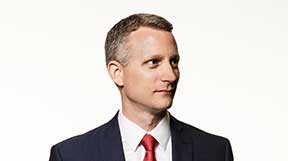Most professionals experience their eureka moment sometime during the early years of their career—when a trusted mentor activates in them an interest or enthusiasm, say, or a project proves unusually fulfilling. Alcon’s Joe Rappon, however, dates his back to sixth grade.
It occurred on the day after he got his first pair of prescription glasses. “I walked into the parking lot at school and  was able to see the leaves in the distance for the first time in a while,” he recalls. “I decided right there that I wanted to help people see better.”
was able to see the leaves in the distance for the first time in a while,” he recalls. “I decided right there that I wanted to help people see better.”
First as an optometrist in private practice and currently as Alcon’s global program head, research and development, Rappon has managed to do just that. And now, as Alcon’s lead on its smart-lens collaboration with Google Life Sciences, he stands to impact individuals with diabetes as well.
It’s a responsibility Rappon embraces. He enjoyed his years in private practice, especially the wealth of patient interaction. But running a practice made it impossible to conduct much research. Given his background—he completed a master’s degree in vision science while simultaneously pursuing his doctor of optometry studies at the State University of New York at Geneseo—the research itch was one he needed to scratch.
Rappon admits that the transition to industry was challenging, owing both to his regret at “walking away” from his longtime patients and to the shift from running the show and settling in as a cog in a huge machine. But it took only a few weeks under the Novartis roof (which completed its acquisition of Alcon in 2011) for Rappon to comprehend the breadth of his new employer’s talent base.
“When you’re in practice, you’re expected to be the expert in anything you do,” he explains. “When you work in industry, you’re exposed to things that you’d never be exposed to in practice. I’m always learning.”
Rappon’s first defining moment in industry came as a key contributor to the launch of the Air Optix Aqua Multifocal contact lens, a product designed to help patients suffering from presbyopia, an age-related condition affecting up-close vision. Witnessing the product’s effect on patients—it became the top-selling multifocal contact lens in the world—affirmed that he was in the right place.
“It changed my perspective. We weren’t just making a product for wherever we happened to sit on a day-to-day basis,” he says.
Which must make his work in partnership with Google Life Sciences on a trio of next-generation lenses—a glucose-sensing smart lens for diabetes patients, a lens for presbyopia patients and a monofocal interocular lens  for post-cataract patients—feel doubly significant. The three projects, which began last year, could transform the contact-lens business—and, given Alcon’s status as one of Google Life Sciences’ most active collaborators, the company itself.
for post-cataract patients—feel doubly significant. The three projects, which began last year, could transform the contact-lens business—and, given Alcon’s status as one of Google Life Sciences’ most active collaborators, the company itself.
Though the relationship started with a getting-to-know-you period (“there was a little bit of a feeling of the unknown,” Rappon admits), most concerns were vanquished within a month or two. “We’re like-minded. We speak the language of science. We all have a technical background of some kind,” he says of his collaborators. It helped that roles were clearly defined from the outset: Google Life Sciences offers the ability to rapidly prototype miniature electronics while Alcon brings expertise in device and drug development along with clinical and regulatory know-how.
If Rappon is even slightly fazed by the high-profile nature of the work and the outsize expectations, he’s not letting on. In fact, he welcomes the overflow of interest from the media, physicians and, especially, patients. “Healthcare is a partnership between a patient and a physician,” he explains. “You can have the best physician in the world—but if the patient doesn’t care, the chance of impacting him is hopeless. If a patient is informed, whether well-informed or not, I know that he cares.”
It goes without saying that the smart-lens projects will dominate Rappon’s attention for the next few years. Happily for him, he has a resource for staying in touch with the world of practice—one who’s just across the dinner table. “My wife is an optometrist, which helps keep me rooted,” he says. “She’ll tell me about different cases and I’ll help her think through them, and she’ll do the same thing for me. I’m lucky to have her as a sounding board.”
From the October 01, 2015 Issue of MM+M - Medical Marketing and Media








